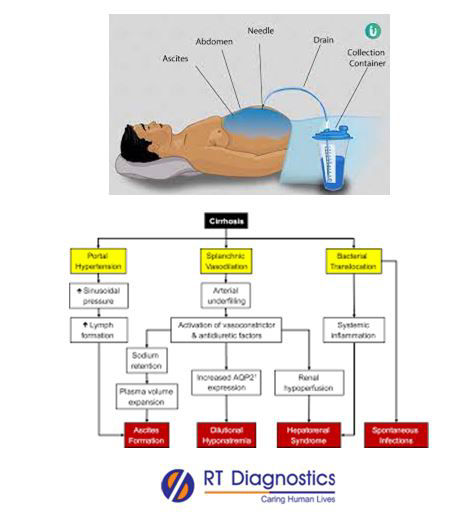Chloride Ascitic Test:
Why Chloride Ascitic Test?
CLINICAL INFORMATION
Chloride is one of the most important electrolytes (other than sodium, potassium, bicarbonates) in the human system that helps to maintain electrical neutrality at the cellular level (by moving into or out of the cells as needed). Electrolytes are electrically charged minerals that regulate the fluid volume and electrolyte balance (of acid-bases – pH balance) in the body and monitor treatment (prognosis – effectiveness of treatment). It helps to maintain fluid homeostasis inside and outside the cells and thus regulates blood volume, blood pressure, and pH of body fluids. Symptoms that may indicate electrolyte (chloride) imbalance include excessive fatigue, muscle weakness, breathing difficulties, frequent vomiting, prolonged diarrhea, excessive thirst, and high blood pressure. Chloride Test helps measure the level of chloride in blood or urine, hence is ordered as a part of electrolyte panel or basic metabolic panel or during routine health check-up and also in some pathological conditions (abnormal levels of chloride). The main source of chloride for the body is food intake (consumption of food) and table salt. Most chloride is absorbed by the digestive tract and excess is eliminated in urine. Symptoms of low chloride (hyperchloremia) include fluid loss, dehydration, weakness or fatigue, difficulty in breathing (respiratory distress such as hyperventilation caused by respiratory alkalosis) diarrhea, and/or vomiting. Excessive secretion of certain hormones such as cortisol and aldosterone can also contribute to body fluid loss (leading to chloride depletion). Other causes of chloride imbalance include congestive heart failure, diabetic ketoacidosis, aldosterone deficiency, prolonged vomiting or gastric suction, Addison disease, emphysema, malabsorption syndrome, primary aldosteronism, chronic lung diseases can lead to respiratory acidosis and/or loss of acid from the body (Metabolic acidosis), etc. Symptoms of high chlorine (hyperchloremia) include kidney failure or kidney disorders, High levels of blood sodium, Cushing syndrome diabetes insipidus and/or diabetic coma, loss of body fluids from prolonged vomiting, sweating or high fever (dehydration), drugs like NSAIDs, Hormones (androgen, corticosteroids, estrogens) and certain diuretics, etc. Chlorine test is ordered as a part of electrolyte panel (sodium, potassium, chlorine, bicarbonates) in certain conditions such as kidney diseases, heart failure, liver diseases, and high blood pressure, etc that leads to an imbalance of fluids in the body. Other tests such as blood gases may also be ordered to further evaluate the severity and cause of extreme imbalance (acidosis or alkalosis).ASCITIC FLUID: Ascites can result due to abnormal or pathological conditions that result in Transudate and/or Exudates i.e an infectious cause or due to certain disorders (including conditions such as liver cirrhosis, circulatory dysfunction, tuberculosis, pancreatitis, underactive thyroid, heart failure, cancer of peritoneum, liver, lymphatic system, ovaries, breast, bowel, stomach, pancreas, lung, womb, etc) that results in fluid accumulation due to abnormal sift of body fluids from other compartments. Once the fluid specimen screens the suspected cause of the disease or condition (Transudate or Exudates) causing ascites, further analysis is performed for its confirmation. Peritoneal fluid analysis is used to help diagnose the cause of fluid build-up in the abdomen (ascites) and/or inflammation of the peritoneum (peritonitis). High attenuation of ascites in abdominal ultrasound is thought to be due to high protein and cellular content. Symptoms of ascites include nausea, vomiting, tiredness, breathlessness, urine urgency and constipation and the clinical findings with signs of ascites include fluid retention causes pressure on other internal organs causing discomfort, bloating, abdominal and back pain, etc. The aim of diagnosis and prognosis depends on the correlation of sodium (Na), potassium (K), chloride (Cl), bicarbonate, creatinine, protein, etc, and it is compared with corresponding electrolytes level in the venous blood specimen of the suspected ascetic patients. Chloride Ascitic fluid or Ascetic fluid chloride test is performed to measure the levels of electrolytes such as chloride before and after diuretic therapy in patients as a protocol for prognosis. Complications of untreated or chronic ascites include spontaneous bacterial peritonitis (a life-threatening infection), blood sepsis, migration of fluid into lung cavities, hepato-renal syndrome, weight loss and protein malnutrition, mental confusion, altered consciousness. Change in level of alertness and/or COMA (hepatic-encephalopathy). Other tests for confirmation of ascites include ultrasound and imaging studies like X-Rays, MRI, CT Scan, etc, and systematic clinical examination procedures such as inspection, auscultation, percussion, palpation, and scratch test are performed for bulging flanks, flank dullness, shifting dullness, fluid wave, puddle sign, etc, are tested (High attenuation of ascites in abdominal ultrasound is thought to be due to high protein and cellular content) and elevated jugular venous pressure is also checked and further biochemical investigations such as liver function tests (to check impaired liver function), coagulation tests, etc.

General Instructions:
Sample Requirement: Specimen - Ascitic Fluid. Test Preparation: None.
NOTE - Sample for specimen collections may vary based on the patient’s condition/cases according to the patient’s presenting complaints / signs or symptoms:
SPECIMEN REQUIREMENT (Special or Rare Cases) - As instructed and guided by Physician / Clinician / Pathologist / as per Laboratory’s requirements, according to procedures and protocols.
Sample Requirement: Ascitic Fluid
Test Preparation: None
This Multi-Specialty Clinical Referral Laboratory RT DIAGNOSTICS provides precise and accurate tests with an extensive range of testing services to the medical centers to help in the diagnosis and identification of pathology in the test specimens for infectious diseases and also to evaluate the function of organ systems of the patient. It prevents further complications and helps to stabilize and restore health to near normalcy at the earliest without delay.



